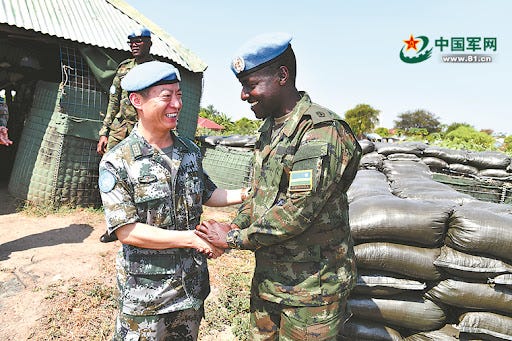Hello and welcome to What China Wants.
This week I’m going to direct you in the direction of an interest-piquing article written by Radomir Tylecote for The Spectator here in the UK.
“China’s growing influence over the Commonwealth armies” explores the way that Beijing is deepening its military connections with countries that have long been associated more with London. In Tanzania, for instance, China has built a new training centre for the Tanzania People's Defence Forces; in Namibia, Beijing is behind the country’s Command and Staff College.
There will be much annoyance in Westminster (at least, the parts not too angry at having colonial ties in the first place) that China is making such significant inroads into Commonwealth nations, and not just in Africa. In the Pacific nation of Vanuatu, the new Chinese embassy has more staff than all other embassies put together.
But it is Africa that is where the most progress is being made by Beijing.

Partly this is because of a lack of interest by the UK and the West, as an old friend of mine, the son of one of the continent’s most prominent presidents told me a few years ago. “Britain is only interested in aid, but China wants trade. Which do you think is going to make us richer?” A simplistic point, perhaps, but it gets to the heart of the attitude towards Africa that has been so prevalent in the capitals of Europe and North America for decades now.
The second reason is that China invests so much more time and effort in cultivating relations there. Under its China-Africa Action Plan 2018-2021, for example, China receives 60,000 African students annually, more than both the UK and US. Not only that, but China provides 50,000 professional training opportunities and 50,000 government fellowships to African public servants. Around 5,000 slots go to military professionals, up from 2,000 under its old 2015-2018 Plan.
The other reason that China is successfully building ties relates very much to the military side of things. China’s People’s Liberation Army (PLA) is not a national military, but instead the armed wing of the Communist Party. This Party-Army model is highly attractive to certain Big Men leaders in Africa, given its ability to concentrate power into a unified structure that combines political leadership with military power. More often than not, as is the case in China, economic power and riches follow.
Nowhere is this more the case than in Zimbabwe. Under Emmerson Mnangagwa, aka “The Crocodile”, and President Mugabe before him, the military and political divisions of the country’s leadership have been very much blurred. As have its economic policies. In 2019 a multibillion dollar platinum mine in the country was put on hold after investors became spooked over an army stake in the project.
Not everyone in Africa wants this Party-Army model to succeed. Retired South African Colonel Abel Esterhuyse is one of them. He identifies robust civilian oversight, education, and training on constitutional roles and responsibilities as essential components in building professionalism and ensuring that soldiers do not become a political liability.
All over the continent there are military men who take more inspiration from the European attitude to military segregation from the political system, as I know from personal experience. But it takes two to tango, and if they West doesn’t push this as a model to be followed - backed up by serious funding - then it cannot be surprised if Africa goes its own way.
This is not to say that the West, especially the UK, is not helping the continent’s armies. Britain alone has 22 training missions there, plus anti-Islamist troops in Mali and counter-poaching patrols in Kenya. But, to be blunt, this is hardly the same as providing a shiny new defence academy.
For all London’s aspirations with the developing world, including the Commonwealth, what really matters is money and time invested. This is the only way to compete with China on the ground, including with their militaries. Sadly, this is a perennially uphill struggle. Despite all the plaudits, Biden and Boris’ Build Back Better plan is yet to receive a penny in funding, whereas the Belt & Road Initiative it aims to compete with continues to invest billions of dollars into projects all over the world.
There are some that believe China’s influence to be unstoppable, especially in Africa. But if the West remembers that what these countries want is to be take seriously and to be given the opportunity to develop, then they stand a chance to properly counter their strategic rival for influence.


